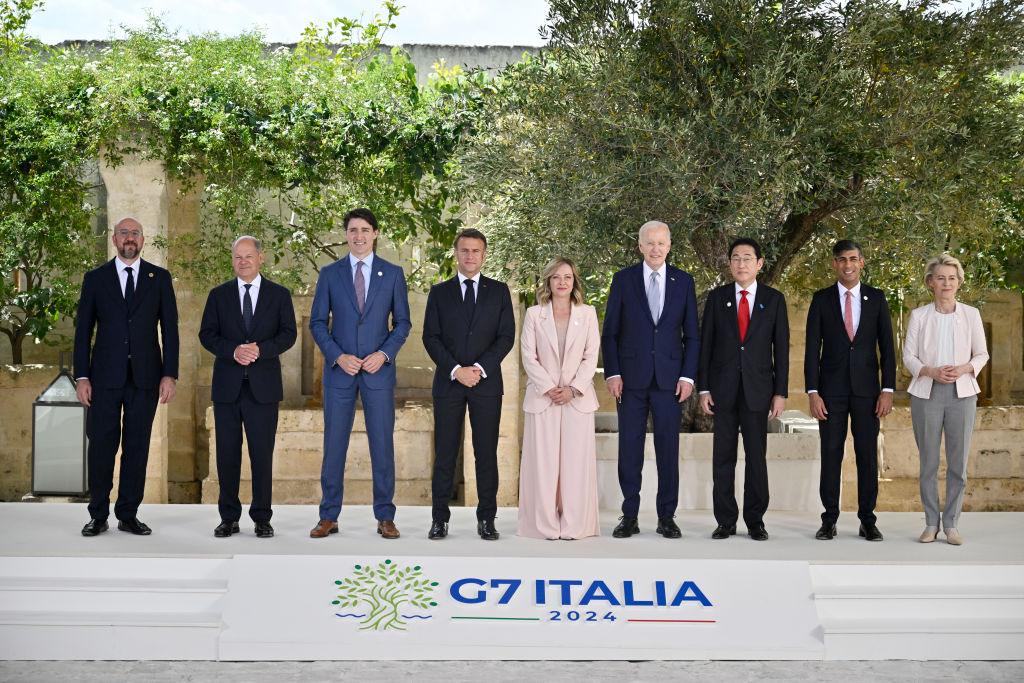Leaders of the Group of Seven major democracies started their annual summit on Thursday, many of them under a cloud at home but determined to make a difference on the world stage as they seek to help Ukraine and counter China’s economic ambitions.
Heading into two days of talks, diplomats said a deal had been agreed in principle on plans to issue $50 billion of loans for Ukraine using interest from Russian sovereign assets frozen after Moscow launched its invasion of its neighbour in 2022.
Western nations were also unanimous in their concern over China’s industrial overcapacity, which they say is distorting global markets, and their determination to help African states develop their economies, diplomats said.
“There is a lot of work to be done, but I am sure that in these two days we will be able to have discussions that will lead to concrete and measurable results,” Italian Prime Minister Giorgia Meloni told her G7 guests as their talks started in a luxury hotel resort in the southern region of Puglia.
While Meloni is flying high after triumphing in weekend European elections, the leaders of the other six nations – the United States, Japan, France, Germany, Britain and Canada – face major domestic woes that risk undermining their authority.
U.S. President Joe Biden faces an uphill battle to win re-election in November, British Prime Minister Rishi Sunak looks certain to lose power at a national poll next month and French President Emmanuel Macron dissolved his country’s parliament on Sunday after his party was trounced in the European vote.
All smiled broadly as they greeted Meloni under a blazing sun at the entrance to the Borgo Egnazia resort where they will spend the next two days in sessions that will later be opened to a host of fellow leaders, including Pope Francis.
For a second year running, Ukrainian President Volodymyr Zelenskiy will attend the summit, taking part in talks on Thursday afternoon, after which he will sign a new, long-term security accord with U.S. President Joe Biden.
The G7 leaders will also almost certainly announce that they have agreed the outline of a multi-year loan using profits from the impounded Russian funds, which legal experts will then finalise with the aim of raising cash by the end of the year.
“I think we will have the major tentpoles of this decided, but some of the specifics left to be worked through by experts on a defined timetable,” White House National Security Adviser Jake Sullivan said of the discussions.
A person close to the talks said the point of deal was to ensure it can run for years regardless of who is in power in each G7 state – a nod to concerns that U.S. Republican presidential candidate Donald Trump might be much less favourable to Kyiv if he beats Biden in November.
PACKED AGENDA
Biden’s goal at the G7 was to reinforce the idea that the United States is best served if it is closely aligned with its democratic allies, Sullivan said, when asked about the prospects of it being the president’s last summit given the looming re-election battle.
Underscoring U.S. determination to punish Moscow for its invasion of Ukraine, Washington on Wednesday dramatically broadened sanctions on Moscow, including by targeting China-based companies selling semiconductors to Moscow.
By announcing new restrictions on Chinese firms on the eve of the G7 meeting, Biden was no doubt hoping to persuade Western allies to show greater resolve in confronting Beijing over its support for Russia and its industrial over-capacity.
Speaking ahead of the start of the summit, Sullivan said that China was a significant creditor to many heavily indebted countries.
“The G7 communique is not singling out or focusing on a single country,” he said, but added that China needed to play a constructive role in dealing with the debt burden.
Eager not to appear like an elitist fortress, the G7 has thrown open its doors to a large number of outsiders this year, including the pope, who is expected to give a keynote speech on Friday on the risks and potential of Artificial Intelligence.
Among those who have also been invited to Puglia are the leaders of some of the biggest regional powers across the globe such as India, Brazil, Argentina, Turkey, Algeria and Kenya.
Although the summit is scheduled to run until Saturday, many G7 chiefs will leave on Friday night, including Biden, meaning the final day has been earmarked for bilateral meetings for those staying on and a closing news conference from Meloni.
(Reuters)














